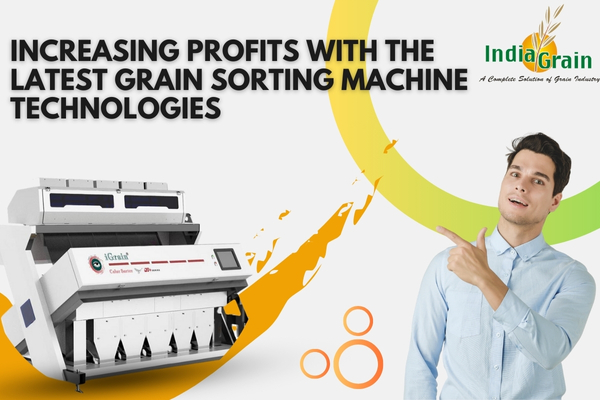
Blog-details
Posted By : Anil Yadav
Blog Date : 19th February, 2024
Increasing Profits with the Latest Grain Sorting Machine Technologies
In today's competitive agricultural landscape, maximizing profits while maintaining high-quality standards is paramount for farmers and grain processors alike. With the rapid advancements in technology, grain sorting machines have become indispensable tools for optimizing efficiency, reducing waste, and ensuring product quality. In this blog post, we'll explore how leveraging the latest grain sorting machine technologies can significantly enhance profitability in the grain industry
Understanding Grain Sorting Machines
Grain sorting machines, also known as grain sorters or grain separators, are sophisticated devices designed to automate the process of sorting grains based on various attributes such as size, weight, color, and shape. These machines utilize advanced technologies such as optical sensors, cameras, and pneumatic systems to identify and segregate grains with precision and accuracy.
Key Features of Modern Grain Sorting Machines
High-Speed Sorting: Modern grain sorting machines are equipped with high-speed cameras and sorting algorithms, enabling them to process large volumes of grains quickly and efficiently.
Customizable Sorting Criteria
These machines offer customizable sorting criteria, allowing users to define specific parameters based on their quality requirements and preferences
Multi-Spectral Imaging
Some advanced grain sorting machines employ multi-spectral imaging technology to detect subtle defects and foreign materials that may not be visible to the naked eye.
User-Friendly Interfaces
Many grain sorting machines feature intuitive user interfaces with touchscreen controls, making them easy to operate and adjust according to changing sorting needs.
Benefits of Investing in Grain Sorting Machine Technologies
Enhanced Quality Control
By automating the sorting process, grain sorting machines eliminate human error and ensure consistent quality control. They can accurately identify and remove defective grains, foreign materials, and contaminants, thereby improving the overall quality of the final product.
Increased Efficiency and Productivity
grain sorting machines significantly increase efficiency and productivity by streamlining the sorting process and reducing manual labor requirements. With their high-speed sorting capabilities, these machines can process large quantities of grains in a fraction of the time compared to traditional sorting methods.
Reduction in Product Waste
By removing defective grains and foreign materials, grain sorting machines help minimize product waste and maximize yield. This reduction in waste not only translates to cost savings but also contributes to environmental sustainability by minimizing the disposal of unusable grains.
Improved Marketability
Grains sorted using advanced sorting technologies are of higher quality and consistency, making them more attractive to buyers and commanding higher prices in the market. Additionally, the ability to offer superior-quality grains can give producers a competitive edge in the industry.
Enhanced Food Safety
grain sorting machines play a crucial role in ensuring food safety by detecting and removing contaminants such as stones, glass, and metal from the grains. By eliminating these hazards, these machines help mitigate the risk of foodborne illnesses and uphold food safety standards.
Conclusion:
Investing in the latest grain sorting machines technologies is essential for maximizing profits and staying competitive in the grain industry. By leveraging the advanced features and capabilities of these machines, producers can improve quality control, increase efficiency, reduce waste, and enhance marketability. With the right grain sorting solution, farmers and grain processors can unlock new opportunities for growth and profitability in the ever-evolving agricultural market.
Frequently Asked Questions
Grain sorting machines use advanced technologies such as optical sensors and cameras to analyze grains as they pass through the sorting process. Based on pre-defined criteria, these machines identify and separate grains with defects, foreign materials, or contaminants.
Yes, modern grain sorting machines are highly versatile and can be configured to sort various types of grains, including wheat, rice, maize, barley, and more. They can adjust sorting criteria to accommodate different grain sizes, shapes, and colors.
Yes, many grain sorting machines are designed to be easily integrated into existing grain processing lines with minimal modifications. Manufacturers often provide technical support and assistance to ensure seamless integration and operation.
Regular maintenance and cleaning are essential to ensure optimal performance and longevity of grain sorting machines. This may include routine inspections, calibration checks, and cleaning of sensors and components to prevent downtime and ensure consistent sorting accuracy.
